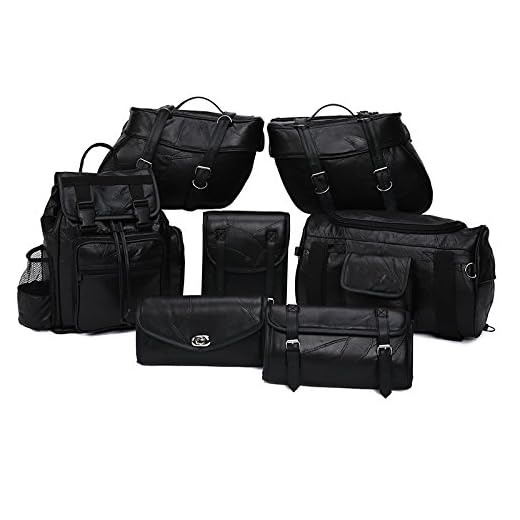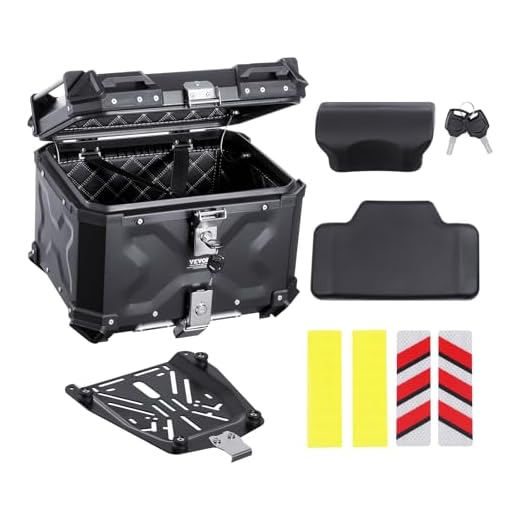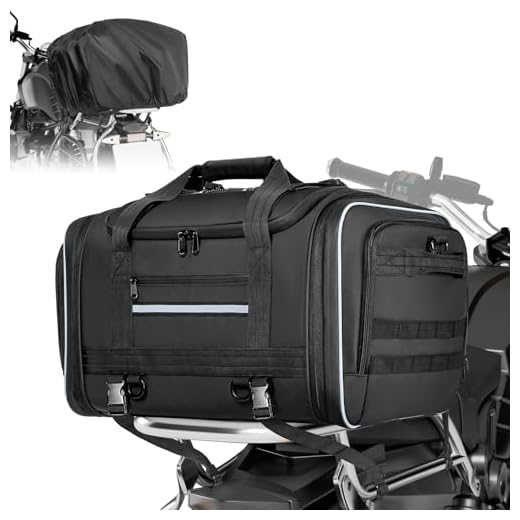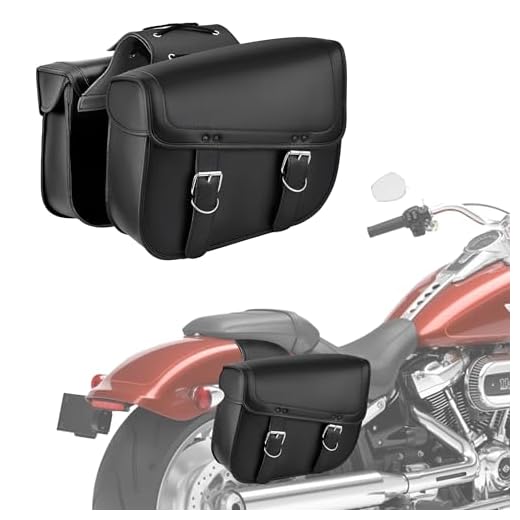







Prioritize your riding style and intended usage before acquiring storage solutions. For daily commutes, opt for compact saddlebags that won’t obstruct handling. For longer excursions, consider larger options like hard cases or touring bags, which provide ample space and security for your belongings.
Evaluate the material of the bags as it significantly affects durability and weather resistance. Fabrics such as nylon or polyester offer lightweight options, while hard shells guarantee robust protection against impacts. Waterproof features can be invaluable for unexpected weather conditions, ensuring your gear remains dry.
Attachment mechanisms play a critical role in the stability of your carrying system. Look for models with secure mounting systems, like integrated hooks or quick-release clips, to minimize the risk of detachment during travel. Versatility is also a factor; removable bags that double as backpacks can enhance convenience off the bike.
Finally, assess the aesthetic appeal. Your choice should complement your motorcycle’s design while reflecting your personal style. A cohesive look enhances the overall experience and can often make a statement on the road.
Recommendations for Selecting Storage Solutions
Prioritize waterproof or water-resistant options to safeguard items from rain and humidity. Look for materials like nylon or polyester treated with a water-repellent coating.
Assess the methods of attachment. Straps, clips, and quick-release systems ensure secure positioning while allowing for easy removal. Test these features for durability and practicality.
Consider size and capacity based on your intended travel duration. Smaller bags suit day trips, while larger variants are ideal for extended travels, ensuring ample space for all necessities.
Evaluate the accessibility of compartments. Multiple pockets and compartments facilitate organization, allowing for quick access to essential gear, tools, or personal items without rummaging.
Compatibility with your vehicle’s design is critical. Ensure the chosen storage solution aligns seamlessly with your bike’s structure to enhance aerodynamics and aesthetics.
Seek out options with reflective elements to improve visibility during low-light conditions, enhancing safety while on the road.
Don’t overlook weight considerations. Lightweight materials provide ample storage without significantly increasing the overall load, ensuring a balanced ride.
Lastly, review user testimonials and ratings for insights on real-world performance and durability, building confidence in your selection process.
Understanding Different Types of Motorcycle Luggage
Prioritize your needs by considering specific types of storage options available. Each variant serves distinct purposes and has unique features that enhance usability. Focus on the following categories:
Soft Bags
Soft bags offer flexibility and are typically made from durable fabric. They are lightweight, ideal for casual trips, and can be easily compressed when not in use. Look for waterproof materials and reinforced areas to ensure they withstand harsh weather conditions. Magnetic or quick-release attachment systems are beneficial for ease of installation and removal.
Hard Cases
Hard cases provide superior protection for valuable items and are often more secure against theft. These rigid containers are usually constructed from molded plastic or aluminum, offering better aerodynamic properties and keeping contents safe during impacts. Opt for options with integrated locks and weather-resistant seals to keep belongings secure and dry. Consider size variations based on your specific carrying capacity needs.
Regardless of the type selected, ensure compatibility with your ride’s mounting points. Assess your storage requirements, frequency of use, and any added functionalities such as integrated padding or expansion options for those longer excursions. Researching additional accessories, like a best pressure washer rotary nozzle, can also prove beneficial for maintaining your gear in optimal condition.
Evaluating Storage Capacity for Your Needs
Determine the volume of items to transport and prioritize storage options accordingly. Assess the length of trips, personal belongings, and any special gear, such as tools or camping equipment.
- Short Trips: A compact solution suffices for essentials: a change of clothes, toiletries, and a few tools. A top case may provide adequate space.
- Long-Distance Travel: Consider more extensive capacity. Saddlebags combined with a tank bag can expand hauling capabilities for extended journeys.
- Weekend Getaways: A combination of a duffel or roll-bag can be practical. Look for options that can attach securely while maintaining balance.
Visualize the dimensions and layout of your motorcycle; ensuring attachments do not interfere with riding posture is critical. Consider weight distribution to maintain stability.
- Active Riders: Opt for lightweight, modular designs that allow for quick packing and unpacking.
- Weekend Warriors: Prioritize versatility; the right packing styles can maximize available space without compromising comfort.
Evaluate whether the additional gear to be carried belongs into categories like camping supplies or tools. This may require specific pack designs that accommodate such items without wastage of space.
Seek solutions that fit your routine needs, and explore options like the best luggage for senior citizens for function-focused designs or check links for lightweight options such as the best luggage 4 wheel check in.
Assess overall durability and weather resistance; longer trips may require robust materials to safeguard belongings. Make sure whatever you choose is easy to access during stops.
Assessing Compatibility with Your Motorcycle Model
Matching accessories to your ride is fundamental for optimal performance. Begin by reviewing the manufacturer’s specifications for your specific bike model, as they often list compatible gear options. Check the attachment points and dimensions, which can significantly influence the fitting of bags and carriers.
Attachment Methods
Evaluate the mounting systems available on your vehicle. Common types include quick-release mechanisms, straps, or hard-mounted options. Each system has its own requirements, so ensure that your selected gear is compatible with the mounting type on your bike.
Capacity and Design
Consider the design’s impact on aerodynamics and weight distribution. A bulky or poorly balanced setup can affect handling, especially at higher speeds. Look for options that integrate seamlessly with the bike’s lines and geometry. The shape and placement can enhance stability and reduce drag.
Exploring Material Durability and Weather Resistance
Opt for high-denier nylon or polyester for excellent abrasion resistance and longevity. These materials not only withstand rigorous use but also offer a light weight, enhancing overall handling when fully loaded.
Consider options with reinforced stitching and high-quality zippers to improve durability under stress and weather exposure. Brands that use YKK zippers often indicate a commitment to quality, ensuring that closures remain functional over time.
Look for products with a waterproof rating of at least IPX4, signifying effective resistance against rain and splashes. This feature is crucial for maintaining the integrity of contents during adverse weather.
A proper internal waterproof liner or a roll-top closure system can provide added protection, preventing moisture from seeping in. Combining these features enhances usability in diverse climates.
Evaluate the material’s UV resistance as prolonged sun exposure may degrade quality. Fabrics treated with UV inhibitors can extend lifespan and prevent color fading.
| Material | Durability | Weather Resistance</th |
|---|---|---|
| High-Denier Nylon | Very High | Waterproof with Liner |
| Polyester | High | Water-Resistant |
| 600D Tarpaulin | High | Completely Waterproof |
| Vinyl | Medium | Water-Resistant |
Inspect seam sealing techniques as this can significantly influence waterproof performance. Thermo-sealed seams are preferable, as they provide a barrier against moisture infiltration.
Finally, always verify user reviews that specifically address weather-related issues and garment longevity to make an informed decision about gear that will stand the test of time.








